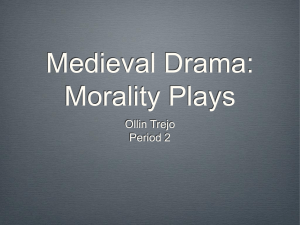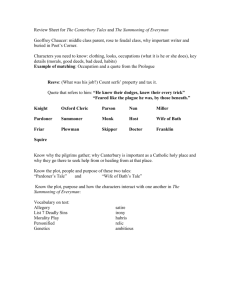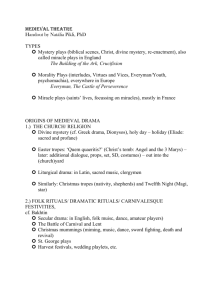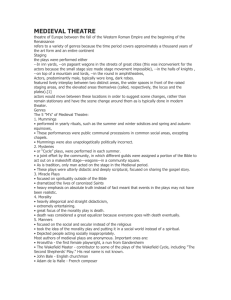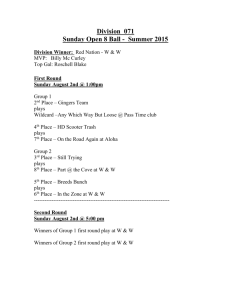A paper on humor in medieval drama. - Newberry
advertisement
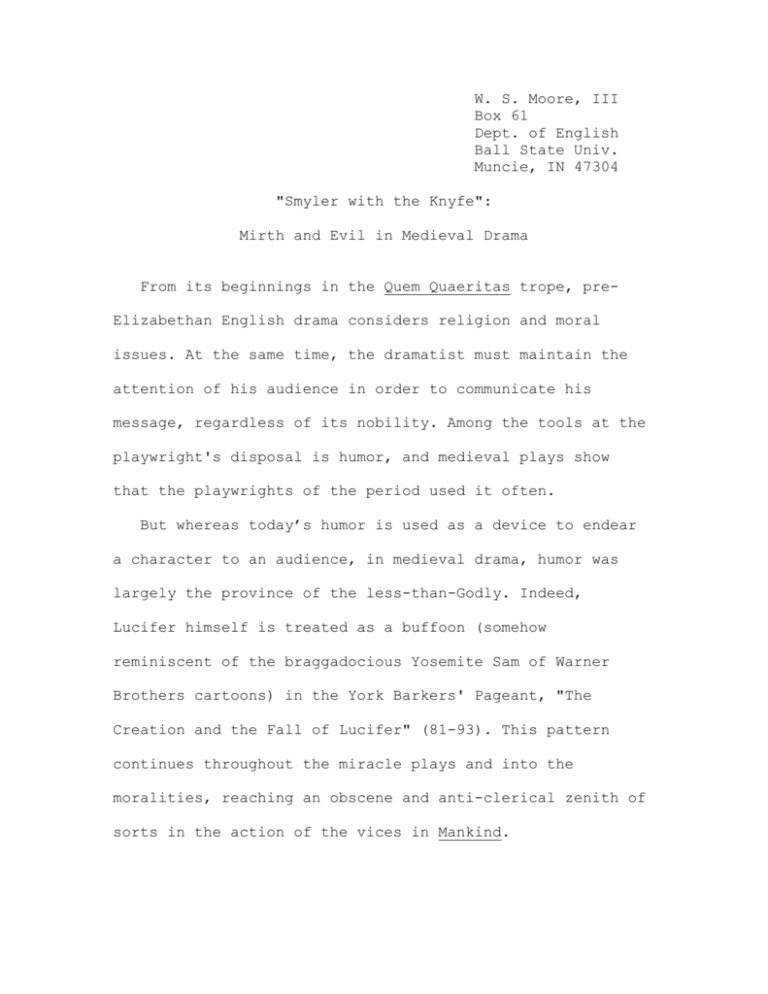
W. S. Moore, III Box 61 Dept. of English Ball State Univ. Muncie, IN 47304 "Smyler with the Knyfe": Mirth and Evil in Medieval Drama From its beginnings in the Quem Quaeritas trope, preElizabethan English drama considers religion and moral issues. At the same time, the dramatist must maintain the attention of his audience in order to communicate his message, regardless of its nobility. Among the tools at the playwright's disposal is humor, and medieval plays show that the playwrights of the period used it often. But whereas today’s humor is used as a device to endear a character to an audience, in medieval drama, humor was largely the province of the less-than-Godly. Indeed, Lucifer himself is treated as a buffoon (somehow reminiscent of the braggadocious Yosemite Sam of Warner Brothers cartoons) in the York Barkers' Pageant, "The Creation and the Fall of Lucifer" (81-93). This pattern continues throughout the miracle plays and into the moralities, reaching an obscene and anti-clerical zenith of sorts in the action of the vices in Mankind. 2 This is not to say that the plays equate good cheer with evil -- far from it. As R.D.S. Jack notes in his Patterns of Divine Comedy, the cycle plays present a divine comedy, culminating in the ultimate triumph of righteousness and spiritual joy. The distinction Jack draws is one between that serene spiritual joy and the coarseness of earthly merriment: "Mediaeval Drama therefore is concerned with two levels of existence -- the spiritual and the temporal; the forms and the shadows" (11). What we commonly see as the comic in these dramas is at best a shadow, at worst a perversion, of the prospect of heavenly bliss offered to the Christian. It is not surprising, then, that the Cycle plays abound in humor, but we must note that the humor is not associated with the forces of goodness. Proof of this lies in an examination of the instances in the plays that tend to risibility, with particular regard to the cycle plays, Everyman, and Mankind. In all of these cases, laughter is the territory of either the earthly or the infernal. The Cycle Plays and the Villain as Buffoon One of the first instances of risibility in the story constructed by the Cycle plays en masse can be seen in the previously mentioned account of the Fall of Lucifer. 3 Lucifer's braggadocio and arrogance culminate in the ultimate pratfall and a slapstick episode as his erstwhile followers, the lesser devils, beset him. The misfortune of the braggart allows the audience to laugh at him -- what would be horrible if it happened to an innocent is humorous when it happens to an evil character. Another example of this can be seen in the Wakefield Cycle's account of Cain and Abel, where the character of Garcio the plowboy acts as comic foil to the loutish Cain. Again, the villain is also a buffoon. By laughing at him, the audience almost transitively makes villainy the province of fools. The character of Noah's wife in the Chester version of Noah's Flood moves the notion of this brand of humor from the outright villain to the individual who is too foolish to understand God's plan. Noah's wife is not evil -- she is spared from the Flood, after all -- but she is disobedient to her husband, who is of course aware of God's intent (197-208). She is willing to risk destruction at the hands of God for the earthly pleasure of gossip and wine (23336). Here the longstanding comic type of the contrary wife is pressed into service as the fool as well. The persistence of her folly is made manifest even aboard the Ark, where she boxes Noah's ears (246). 4 Joseph plays a similar role in the "Coventry" Annunciation. Unaware of God's plans for Mary, he denounces her: Ye be with child so wondrous great, Ye need no more thereof to treat Against all right. Forsooth, this child, dame, is not mine. Alas, that ever with mine eyne I should see this sight! (111-16) Joseph then leaves (126-42), only to be the butt of laughter when he must come crawling back to her. His misplaced and thwarted pride is the object of the joke, which is carried out to a greater extent in the York version of the pageant, with considerably more bluster on Joseph’s part. Perhaps the richest humor in the Cycle plays, however, takes place in The Second Shepherds' Play. The play's twopart structure is heavily skewed toward the comic tale of the shepherds and Mak the sheep-stealer. Mak, the ostensible villain in the piece, is the primary instrument of humor in the play as well. His very entrance into the story is accompanied by an affected accent that the shepherds denounce as an attempt 5 at self-aggrandization (205-18). He pretends to be a sorcerer as he puts the shepherds to sleep, but it is after he steals the sheep that his schemes explode for full comic effect. Mak and his wife Gill connive to pass the stolen sheep off as their latest child. When the ruse fails, they persevere, with their explanations becoming increasingly absurd and laughable (602-19). Finally, Mak meets a slapstick fate by being tossed in a blanket. Again, the funniest characters are the unrighteous ones -- although to be fair, the shepherds get some funny, coarse lines as well, as we see in Gib’s complaint, complete with double entendres: Silly Copple, our hen, both to and fro She cackles; But begin she to croak, To groan or to cluck, Woe is him our cock, For he is in the shackles (67-72). Like Mak, another schemer meets his downfall in the Cornish Death of Pilate. Pilate knows that he will escape punishment as long as he is clad in Christ's robe. When his 6 secret is discovered, he attempts to "fast-talk" his way out of surrendering the robe before receiving his just desserts. He begins by claiming that the robe is soiled and unfit for the king (239-240). When that approach fails, Pilate claims modesty, a desire not to appear naked before the king – ironically, this is true enough spiritually as well as physically. Once more, the audience derives amusement by watching the villain squirm. In other Cycle plays, humor is juxtaposed with horror. While there are obviously elements of comic relief at work here, the link between evildoers and humor remains. An outstanding example of this may be seen in the Wakefield Herod the Great. The soldiers who would perform the slaughter of the innocents are braggarts. A clear example of this is the First Soldier's claim that he would be "good for a score" of victims (319). While this would be impressive if his victims were armed enemies, the fact that he is boasting of skill in infanticide (something that should be shameful) makes him ironically amusing, a point driven home when the soldiers are driven away by angry women in the aftermath of their deeds (381-91). The character of Herod himself can also be a figure of exaggeration. In the Wakefield pageant, Herod is an arrogant blowhard who esteems himself above all other 7 rulers, but the mere notion of a greater king fills him with fear sufficient to order atrocities. By the end, however, his counsel is the ironic, "Be not too cruel" (511 -- italics mine). Michael L. Hall compares this Herod with the Herod of Jesus Christ, Superstar as holding a certain humorous charm that brings the character's evil into sharper focus (111-116). The audience laughs at all these villains as the plays are performed. But what are the implications of that laughter? Turning these wrongdoers into figures who can be laughed at puts the Christian audience in a position of superiority. It would take the later moralities to bring sin closer to home, but here, too, the laughs go to the ungodly, mere shadows of the spiritual joy that should be the audience's ultimate goal. Everyman and Ironic Humor The linking of humor and Everyman may appear oxymoronic on first blush -- while the play's ending offers salvation for Everyman, it is hardly an exercise in good feeling. But the humor is there for the taking. As Everyman seeks company for his journey, humor stems from the irony of the situation. Fellowship, Cousin, and Kindred all declare their loyalty to Everyman, even unto 8 death, little realizing that that could well be their destination. Once that truth is revealed, the audience (which has known this all along) can smile as they backtrack. Contrast Fellowship's boasts: "If any have you wronged, ye shall revenged be/ Though I on the ground be slain for thee/ Though that I know before that I should die" (218-20) and "For in faith, and thou go to hell/ I will not forsake thee by the way" (232-33) with his denials: "So I said, certainly/ But such pleasures be set aside, the sooth to say" (257-58) and "But, and thou had tarried, I would not have left thee so" (294). The audience can be ironically amused at the gap between pledge and truth. Similar action takes place in Everyman's dealings with Kindred and Cousin. Cousin asserts that "we live and die together" (324), but begs off as he learns of the crisis, claiming "cramp in my toe" (356) -- a true molehill compared to the mountain Everyman must cross. Kindred follows up empty offers of loyalty (325-26) with an equally empty (and given the knowledge of Everyman's condition, even more cynical) offer of his maid's companionship, "If that you and she may agree" (363-64). Everyman's physical attributes follow the pattern as well, claiming loyalty (675-94) only to desert him at the 9 end. Here, too, the viewer can smile ironically, remembering the transience of worldly gifts when contrasted with eternal redemption. Of course, despite the hero's name, his discomforts take place at the comfortable distance of drama. The amusing ironies of Everyman's travails are less amusing when we are faced with a memento mori of our own. By contrast, the truly good characters in the play are utterly earnest. Good Deeds and Knowledge are most serious, recognizing the gravity of Everyman's situation. Other godly characters, such as the Angel, the Doctor, and Death are, are equally serious. Humor, even of the ironic nature seen here, is to be found only with regard to earthly things. However, another morality gives humor a far more prominent -- and more ominous -- role. Mankind, Satire, and Vice While we can laugh at the foolish evildoers in the Cycle plays and smile at the irony of the false love of the worldly in Everyman, it is in Mankind, the third of the Macro Plays, that laughter most explicitly becomes the property of the ungodly. The characters of the vices, called Mischief, Nought, New Guise, and Nowadays, are the source of all the play's laughter, but that laughter comes 10 as a result of their satire of righteousness, and by extension, of God. The play begins with a sermon from the character of Mercy. Mercy's diction here is Latinate and learned -words like obsequyouse (5), rectyfye (13), and perseuerante (25) -- all are the sort that might be used by a learned person known to the typical member of the audience: a priest. It is of interest then that Mischief, in his first appearance, uses the same high-toned diction at first: "I beseche you hertyly, leue yowr calcacyon. . . leue yowr dalyacyon. . . ye are full of predycacyon" (45-7). By line 57, Mischief is even spouting bogus Latin, treading on a sort of consecrated linguistic ground: "Corn seruit bredibus, chaffe horsibus, straw fyrybusque." He delivers that line in an equally sermonistic manner, "as yt schewth be this werse" (56). The lines will draw laughs, but they simultaneously mock the closest thing to a priest the play provides, as Jack notes: "[Mischief] parodies the style of his opponent's speech, then replaces it with his own colloquial idiom" (167). It is with good reason then that this character's name is Mischief, which Jack informs us meant wickedness in the time of the play's performance (166). 11 Jack also presents a key to understanding the distinction between the play's comic elements and the concept of Mankind as Divine Comedy. Mercy (and ultimately, the entire play) is concerned with the salvation of Mankind (the character, and of course, the race) -- a spiritual happy ending. The vices are focused upon the world and the flesh. Their earthy humor has a degree of charm, but we are not to forget that their goal is the destruction of Mankind. The audience must distinguish between worldly mirth and spiritual joy (Jack 165-66). The vices, like Chaucer's smyler, present a charming appearance with a hidden capacity for destruction. As the other vices appear in the play, they parody the cleric and Latin as well. They employ clerical language to deal with vulgar subject matter, ranging from theft (12627) to excrement (130-35) and sexual activity (143-46). A little later, they mock the responsive psalmody, disguising their action as a Christmas song that quickly turns obscene. The juxtaposition of the lewd with the sacred creates humor, but of a sort that jeopardizes not only Mankind but the audience, which is invited to join in as well (331-43). Later, the vices mock Mankind's use of Bible verses with more bogus Latin (398-400). 12 After a slapstick sequence, where Mankind repels the vices with his shovel, the vices trick Mankind into an ersatz contract of sins. It begins with a sequence of fast talk and nonsense legalese: "Blottybus in blottis/ Blottorum blottibus istis” (680-81), and is a genuinely funny sequence, but the audience must remember that it is a means of leading Mankind to forsake his spiritual happiness for worldly desires (702-25). As it goes on, Mankind's sober clothing is altered by the vices into his "new guise," which is rather silly looking. As Tony Davenport notes, this makes the sinner a figure of amusement as well (114). From those amusingly presented sins, Mankind moves into despair, and is counseled by the vices to hang himself. Humor has departed the scene, just in time for Mankind's redemption, as administered by Mercy, God's representative in the play. Of note here is Mercy's "explanation" of the previously amusing characters: Ye hawe thre aduersayis and he ys mayster of hem all: That ys to sey, the Dewell, the World, the Flesch and the Fell. The New Gyse, Nowadyis, Nowgth, the World we may hem call; 13 And properly Titiuillus syngnyfyth the Fend of Helle . . . . . . . . . . . . . . . . . . . . . . . . . . These be your. . . gostly enmyis, in whom ye hawe put your confidens. (883-88) Ultimately, we see that mirth is the province of the wicked in this morality. The capacity of these plays, from the Cycles to Mankind, for amusement is evident. Equally evident is the fact that mirth is not associated with the emissaries of goodness in those plays. This puts the viewer of the plays in an interesting position. Viewing these plays, one may be charmed, like Mankind, by wickedness in its appealing guise. However, by the end of each play or cycle, righteousness has triumphed and humanity is redeemed. Perhaps part of the appeal of these plays, then, lies in their ability to let the audience laugh along with evil while remaining confident of eventual salvation -- they allow the viewer to eat his cake and have it too, a condition with charms of its own. 14 Works Cited "Annunciation." Ed. A.C. Cawley. Everyman and Medieval Miracle Plays. London: Everyman, 1993. 65-74. "Creation, and the Fall of Lucifer." Ed. A.C. Cawley. Everyman and Medieval Miracle Plays. London: Everyman, 1993. 1-8. "Death of Pilate." Ed. A.C. Cawley. Everyman and Medieval Miracle Plays. London: Everyman, 1993. 227-53. Everyman. Ed. A.C. Cawley. Everyman and Medieval Miracle Plays. London: Everyman, 1993. 195-225. Mankind. Ed. Mark Eccles. The Macro Plays. London: Oxford UP, 1969. 153-184. "Noah's Flood." Ed. A.C. Cawley. Everyman and Medieval Miracle Plays. London: Everyman, 1993. 33-48. "Second Shepherds' Pageant." Ed. A.C. Cawley. Everyman and Medieval Miracle Plays. London: Everyman, 1993. 75104. Davenport, Tony. "Lusty Fresche Galaunts." Ed. Paula Neuss. Aspects of Early English Drama. Cambridge: D.S. Brewer, 1983. 111-26. 15 Hall, Michael L. "Jesus Christ, Superstar and Medieval Drama: Anachronism and Humor." Ed. Richard K. Emmerson. Approaches to Teaching Medieval English Drama. New York: Modern Language Association of America, 1990. 111-15. Jack, R.D.S. Patterns of Divine Comedy: A Study of Medieval English Drama. Cambridge: D.S. Brewer, 1989.


